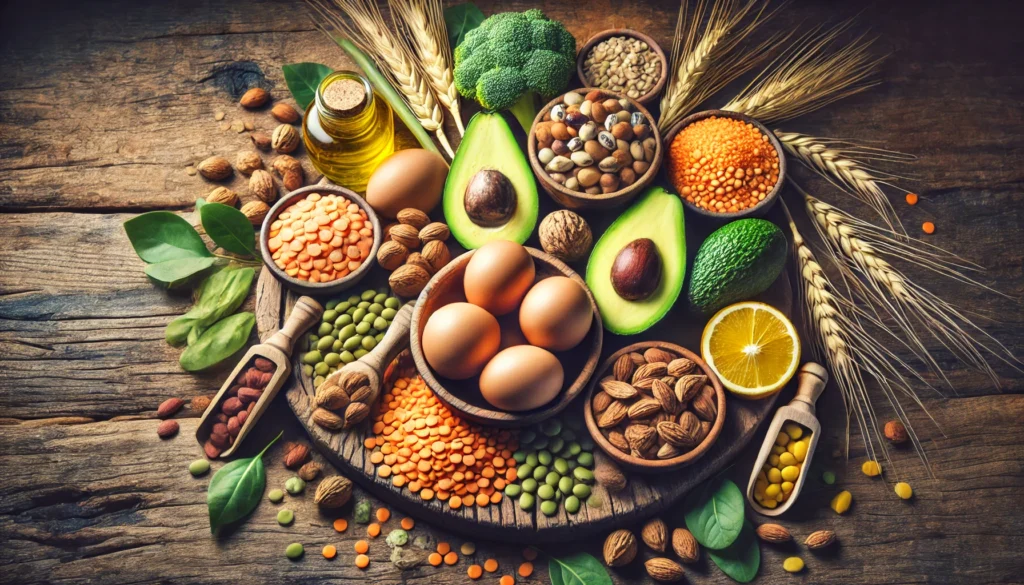Menstrual cramps are a common and often debilitating issue faced by many during their menstruation period. While the discomfort varies in intensity from person to person, there’s a growing body of evidence suggesting that nutrition plays a significant role in alleviating menstrual pain. By focusing on the right vitamins and minerals, you can potentially reduce the severity of cramps and enhance overall well-being. This article will delve into the vitamins and minerals that are essential for managing menstrual cramps and highlight the best foods to consume during your period.
You may also like: Best Vegetables for Hormonal Health Benefits
Understanding Menstrual Cramps
Before exploring the nutritional aspects, it’s essential to comprehend what causes menstrual cramps. Medically termed dysmenorrhea, menstrual cramps occur due to the contraction of the uterine muscles induced by hormone-like substances known as prostaglandins. These contractions are a natural part of the menstrual cycle, but excessive prostaglandin production can lead to severe cramping and discomfort.
The Science Behind Dysmenorrhea
Dysmenorrhea is often categorized into primary and secondary types. Primary dysmenorrhea is the most common form and is not associated with other pelvic conditions. It’s mainly due to the aforementioned prostaglandins. Secondary dysmenorrhea, however, results from underlying medical conditions such as endometriosis or fibroids, necessitating medical intervention.
Prostaglandins: The Culprits
Prostaglandins are chemicals that play a significant role in the body, including the regulation of inflammation, blood flow, and the formation of blood clots. During menstruation, they stimulate the uterine muscles to contract, facilitating the shedding of the uterine lining. High levels of prostaglandins are linked to more severe menstrual cramps.
Hormonal Influence on Cramps
Hormonal fluctuations throughout the menstrual cycle can exacerbate or alleviate cramps. Estrogen and progesterone levels influence the production of prostaglandins and the sensitivity of the uterus to these chemicals. Understanding these hormonal changes can help in managing the timing and intensity of cramps.
The Role of Nutrition in Easing Cramps
Nutrition plays a pivotal role in managing menstrual cramps. A balanced diet rich in specific vitamins and minerals can help reduce inflammation, regulate muscle function, and balance hormones, ultimately alleviating pain.
Anti-Inflammatory Diet for Menstrual Health
An anti-inflammatory diet focuses on foods that reduce inflammation and limit the intake of those that may exacerbate it. This includes consuming more fruits, vegetables, whole grains, and healthy fats, while reducing processed foods and sugars.
Hydration and Its Impact
Staying well-hydrated is crucial during menstruation as it helps in reducing bloating and maintaining optimal cellular function. Adequate water intake supports the delivery of nutrients and the removal of waste products, aiding in muscle relaxation and reducing cramps.
Balanced Macronutrients
Ensuring a balance of carbohydrates, proteins, and fats is essential for energy and hormone regulation. Complex carbohydrates provide sustained energy, proteins support hormone synthesis, and healthy fats are vital for reducing inflammation.

Key Vitamins and Minerals
Magnesium
Magnesium is a vital mineral known for its muscle-relaxing properties. It helps in reducing the intensity of cramps by calming the uterine muscles. Additionally, magnesium can also aid in reducing water retention and bloating, common symptoms experienced during menstruation.
Magnesium’s Role in Muscle Function
Magnesium acts as a natural muscle relaxant, helping to ease the contractions that cause cramps. It plays a role in more than 300 enzyme reactions in the body, including those that regulate muscle and nerve function.
Sources of Magnesium
To boost magnesium intake, incorporate foods such as spinach, almonds, pumpkin seeds, and dark chocolate. Cooking with magnesium-rich herbs like basil and coriander can also be beneficial.
Magnesium Deficiency and Supplementation
A deficiency in magnesium can exacerbate menstrual cramps and other symptoms. If dietary sources are insufficient, magnesium supplements may be considered under professional guidance.
Vitamin B6
Vitamin B6 is essential for maintaining hormonal balance. It aids in the production of neurotransmitters that modulate pain and mood. By reducing the severity of PMS symptoms, Vitamin B6 can be a valuable ally during your menstrual cycle.
Neurotransmitter Production
Vitamin B6 is crucial for synthesizing neurotransmitters like serotonin and dopamine, which regulate mood and pain perception. This can alleviate mood swings and irritability associated with PMS.
Dietary Sources of Vitamin B6
Incorporate bananas, chickpeas, potatoes, and chicken breast into your meals to boost Vitamin B6 levels. These foods are versatile and can be included in various dishes.
Managing PMS with Vitamin B6
Regular intake of Vitamin B6 can help reduce symptoms like moodiness, fatigue, and irritability. For those with severe PMS, Vitamin B6 supplements might be recommended by a healthcare professional.
Omega-3 Fatty Acids
Although not a vitamin or mineral, omega-3 fatty acids are crucial for reducing inflammation. They help in lowering the levels of prostaglandins, thereby diminishing the severity of menstrual cramps.
The Anti-Inflammatory Power of Omega-3s
Omega-3s are known for their ability to reduce inflammation throughout the body. They achieve this by competing with arachidonic acid, which is a precursor to inflammatory prostaglandins.
Sources of Omega-3 Fatty Acids
Rich sources of omega-3s include fatty fish like salmon and mackerel, as well as plant-based options such as flaxseeds and walnuts. Including these in your diet several times a week can provide significant benefits.
Supplementation and Considerations
For those unable to get enough omega-3s through diet alone, fish oil supplements offer a convenient alternative. It’s essential to choose high-quality products to ensure purity and effectiveness.
Calcium
Calcium is renowned for its role in bone health, but it also plays a significant part in muscle function. Adequate calcium intake can help alleviate muscle tension and cramps during menstruation.
Muscle Function and Calcium
Calcium is crucial for muscle contraction and relaxation. By ensuring adequate calcium levels, you can support the proper functioning of the uterine muscles, reducing the severity of cramps.
Dietary Sources of Calcium
Dairy products, fortified plant milk, kale, and broccoli are excellent sources of calcium. Including a variety of these foods in your diet can help maintain optimal calcium levels.
Calcium and Vitamin D
Vitamin D enhances calcium absorption, making it important to ensure adequate Vitamin D intake alongside calcium. Sun exposure and fortified foods are good sources of Vitamin D.
Vitamin E
Vitamin E is an antioxidant that can help reduce inflammation and menstrual pain. Research indicates that Vitamin E supplementation may lead to a noticeable reduction in the intensity of cramps.
Antioxidant Properties of Vitamin E
As an antioxidant, Vitamin E helps neutralize free radicals, reducing oxidative stress and inflammation. This can be particularly beneficial during menstruation when inflammation levels may rise.
Food Sources Rich in Vitamin E
Sunflower seeds, almonds, and avocados are rich in Vitamin E. These can be easily incorporated into meals and snacks to boost your intake.
Supplementation and Safety
Vitamin E supplements are an option for those who struggle to meet their needs through diet. However, it’s crucial to adhere to recommended dosages to avoid potential side effects.

Best Foods to Eat During Your Period
Incorporating foods rich in these vitamins and minerals into your diet can be a natural way to combat menstrual cramps. Here are some good foods to eat on your period:
Leafy Greens
Leafy greens like spinach and kale are excellent sources of magnesium and calcium. They are also rich in antioxidants that can help reduce inflammation.
Nutritional Profile of Leafy Greens
Leafy greens are packed with essential nutrients, including vitamins A, C, and K, which support overall health. Their high fiber content also aids in digestion and maintains steady blood sugar levels.
Incorporating Leafy Greens
Adding leafy greens to smoothies, salads, or sautés can enhance their nutritional benefits. Their versatility allows them to be included in various dishes, making them easy to incorporate into your diet.
Seasonal and Local Options
Choosing seasonal and locally grown leafy greens can provide fresher and more nutrient-dense options. Visiting local farmers’ markets can offer a variety of choices.
Nuts and Seeds
Almonds, sunflower seeds, and flaxseeds are packed with magnesium, Vitamin E, and omega-3 fatty acids. These nutrients are essential for muscle relaxation and reducing inflammation.
Nutrient Density of Nuts and Seeds
Nuts and seeds are concentrated sources of healthy fats, protein, and fiber. They provide a satisfying snack option that can help stabilize blood sugar levels throughout the day.
Creative Ways to Include Nuts and Seeds
Sprinkle nuts and seeds on yogurt, oatmeal, or salads for an added nutritional boost. Creating homemade trail mix or energy bars can be a convenient way to consume them.
Portion Control and Storage
While nutritious, nuts and seeds are calorie-dense, so portion control is essential. Store them in a cool, dry place to maintain freshness and prevent rancidity.
Fatty Fish
Salmon and mackerel are rich in omega-3 fatty acids, which can help lower prostaglandin levels and ease cramps.
Benefits of Consuming Fatty Fish
In addition to omega-3s, fatty fish provide high-quality protein and essential nutrients like Vitamin D and selenium. These contribute to overall health and well-being.
Cooking Methods for Fatty Fish
Grilling, baking, or steaming are healthy cooking methods that preserve the nutritional value of fatty fish. Pairing with vegetables can create a balanced meal.
Sustainable Seafood Choices
Opt for sustainably sourced fish to support environmental conservation. Checking for certifications like MSC or ASC can guide responsible choices.
Whole Grains
Whole grains like brown rice and quinoa are high in magnesium and Vitamin B6. They provide sustained energy and can help reduce bloating.
Health Benefits of Whole Grains
Whole grains are rich in fiber, vitamins, and minerals. They support digestive health, help maintain steady energy levels, and can aid in weight management.
Incorporating Whole Grains
Switching from refined grains to whole grains in meals such as pasta, bread, and cereals can increase fiber intake. Experimenting with different grains like farro or bulgur can add variety.
Shopping for Whole Grains
Reading labels carefully ensures that products are truly whole grain. Look for terms like “100% whole grain” or “whole wheat” as the first ingredient.
Fruits
Bananas, berries, and oranges are rich in vitamins and can provide a sweet, nutritious boost. Bananas, in particular, are high in Vitamin B6 and magnesium.
Nutritional Benefits of Fruits
Fruits are high in vitamins, minerals, and antioxidants. They provide natural sugars for energy and can help satisfy sweet cravings healthily.
Incorporating Fruits into Your Diet
Enjoy fruits as snacks, in smoothies, or as toppings for yogurt and oatmeal. Seasonal fruits offer the best flavor and nutrition.
Storing and Preserving Fruits
Proper storage can extend the shelf life of fruits. Refrigerating berries and keeping bananas at room temperature are simple ways to preserve freshness.
Herbal Teas
Herbal teas such as chamomile and ginger can have anti-inflammatory properties and provide soothing relief from cramps. They also help in reducing bloating and promoting relaxation.
Benefits of Herbal Teas
Herbal teas are caffeine-free and can promote relaxation and hydration. Specific herbs like chamomile and ginger have natural anti-inflammatory effects, soothing menstrual discomfort.
Preparing Herbal Teas
Steeping herbal teas properly ensures maximum flavor and health benefits. Using fresh herbs or high-quality tea bags can enhance the experience.
Exploring Different Herbal Blends
Experimenting with various herbal blends can offer different health benefits. Teas such as peppermint or lemon balm can also provide digestive comfort and relaxation.

Supplements for Menstrual Pain
While a balanced diet should be the primary source of vitamins and minerals, supplements can be beneficial, particularly when dietary intake is insufficient. It’s important to consult with a healthcare professional before starting any supplements.
Magnesium Supplements
Magnesium supplements are widely available and can be an effective way to ensure adequate intake. They are particularly useful for those who experience severe cramps.
Choosing the Right Magnesium Supplement
Magnesium comes in various forms, such as magnesium citrate, oxide, and glycinate. Each has different absorption rates and may suit different needs.
Dosage and Timing
It’s essential to follow recommended dosages and consider timing when taking magnesium supplements. Taking them with food can aid absorption and reduce gastrointestinal discomfort.
Monitoring and Adjusting Intake
Regularly monitoring symptoms and adjusting the dosage under professional guidance ensures the best outcomes. Over-supplementation can lead to adverse effects.
Omega-3 Supplements
Fish oil supplements are a convenient way to increase omega-3 fatty acid intake, especially for those who do not consume fatty fish regularly.
Benefits of Fish Oil Supplements
Fish oil supplements provide a concentrated source of omega-3s, supporting cardiovascular and joint health in addition to reducing menstrual cramps.
Selecting High-Quality Supplements
Choosing supplements with verified purity and potency is crucial. Look for third-party testing certifications to ensure quality.
Vegan Alternatives
For those following a plant-based diet, algae oil supplements offer a vegan-friendly source of omega-3s, providing similar benefits to fish oil.
Vitamin E Supplements
Vitamin E capsules can be an effective method to boost antioxidant intake and reduce menstrual pain.
Understanding Dosage and Safety
Vitamin E supplements should be taken according to recommended guidelines to avoid potential side effects. Consulting a healthcare provider is advised for personalized recommendations.
Combining Vitamin E with Other Nutrients
Pairing Vitamin E with other antioxidants like Vitamin C can enhance its effects. A balanced supplement regimen can provide comprehensive benefits.
Monitoring for Effects
Tracking changes in menstrual symptoms can help assess the effectiveness of Vitamin E supplementation. Adjustments should be made based on individual responses and professional advice.
Conclusion
Understanding the connection between nutrition and menstrual health can empower you to make informed choices that alleviate cramps and improve overall wellness. By focusing on a diet rich in key vitamins and minerals, you can reduce the severity of menstrual pain and promote a healthier menstrual cycle. Always remember to consult with healthcare professionals before making significant dietary changes or starting supplements, ensuring that your approach is both safe and effective.
Empowering Through Knowledge
Educating yourself about the nutritional aspects of menstrual health allows you to take control of your well-being. Knowledge is a powerful tool for making informed dietary and lifestyle choices.
Sustainable Lifestyle Changes
Incorporating these nutritional strategies into your daily routine can lead to long-term benefits. Small, consistent changes often yield the most sustainable results.
Seeking Professional Guidance
Working with healthcare professionals ensures that your approach is tailored to your unique needs. Personalized advice can maximize the effectiveness of dietary and supplement interventions.
By weaving these nutritional strategies into your lifestyle, you can enjoy a more comfortable and balanced menstrual experience.
Further Reading:
Magnesium Supplements for Period Cramps: Do They Help?
9 Herbs to Relieve Menstrual Cramps
Important Note: The information contained in this article is for general informational purposes only, and should not be construed as health or medical advice, nor is it intended to diagnose, prevent, treat, or cure any disease or health condition. Before embarking on any diet, fitness regimen, or program of nutritional supplementation, it is advisable to consult your healthcare professional in order to determine its safety and probable efficacy in terms of your individual state of health.
Regarding Nutritional Supplements Or Other Non-Prescription Health Products: If any nutritional supplements or other non-prescription health products are mentioned in the foregoing article, any claims or statements made about them have not been evaluated by the U.S. Food and Drug Administration, and such nutritional supplements or other health products are not intended to diagnose, treat, cure, or prevent any disease.


